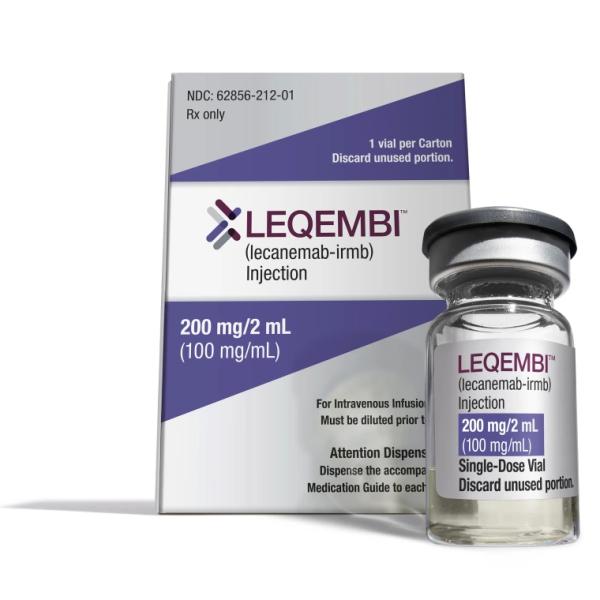Leqembi (injection)
Generic name: lecanemab (injection) [ lek-AN-e-mab ]
Other brand names of lecanemab (injection) include: Leqembi
Drug class: Miscellaneous central nervous system agents
What is lecanemab?
Lecanemab is used to treat adults with Alzheimer's disease.
Lecanemab may also be used for purposes not listed in this medication guide.
Lecanemab side effects
Get emergency medical help if you have signs of an allergic reaction: hives; difficult breathing; swelling of your face, lips, tongue, or throat.
Some side effects may occur during the injection. Tell your medical caregiver if you feel dizzy, nauseated, light-headed, itchy, sweaty, or have a headache, flu-like symptoms, fever, or vomiting; chest tightness, fast/slow heartbeats or pounding heartbeats, back pain, trouble breathing, or swelling in your face.
Common side effects of Leqembi may include:
-
ARIA with symptoms or with signs that appear on an MRI;
-
infusion-related reactions; or
-
headache.
This is not a complete list of side effects and others may occur. Call your doctor for medical advice about side effects. You may report side effects to FDA at 1-800-FDA-1088.
Related/similar drugs
Warnings
Lecanemab can cause temporary swelling or bleeding in the brain that usually clears up with time. This condition may cause no symptoms but can be serious. Call your doctor if you have headaches, dizziness, nausea, confusion, trouble with walking, seizures, or vision changes.
Before taking this medicine
Lecanemab can cause a condition called Amyloid Related Imaging Abnormalities or "ARIA" which is a temporary swelling or small spots of bleeding in the brain that usually clears up with time. Your doctor may perform an MRI of your brain before and during your treatment with lecanemab. Ask your doctor about your risk.
It is not known if lecanemab will harm an unborn baby. Tell your doctor if you are pregnant or plan to become pregnant.
Ask a doctor if it is safe to breastfeed while using this medicine.
How is lecanemab given?
Lecanemab is injected into a vein by a healthcare provider.
This medicine is injected slowly over 1 hour every 2 weeks.
You may be given other medications to help prevent serious side effects or allergic reaction.
Store this medicine in the refrigerator in the original container, do not freeze or shake.
What happens if I miss a dose?
Call your doctor for instructions if you miss an appointment for your lecanemab injection.
What happens if I overdose?
In a medical setting an overdose would be treated quickly.
What should I avoid while receiving lecanemab?
Follow your doctor's instructions about any restrictions on food, beverages, or activity.
What other drugs will affect lecanemab?
Tell your doctor about all your other medicines, especially medicines to treat or prevent blood clots, including aspirin.
Other drugs may affect lecanemab, including prescription and over-the-counter medicines, vitamins, and herbal products. Tell your doctor about all other medicines you use.
Biological Products Related to Leqembi
Find detailed information on biosimilars for this medication.
Popular FAQ
Who makes and manufactures Leqembi (lecanemab-irmb)?
Leqembi is manufactured by Eisai Inc. based in Nutley, NJ, USA. You can contact Eisai at 1-888-274-2378 or online at EisaiPatientSupport.com/Leqembi.
What drugs can help improve or slow down memory loss?
Drugs used to improve or slow down memory include prescription medications (e.g., cholinesterase inhibitors like donepezil) and over-the-counter products like ginseng and nootropics.
Continue readingWhat are Monoclonal Antibodies and how do they work?
Monoclonal antibodies (mAbs) are man-made proteins that mimic the natural antibodies produced by our immune systems. Monoclonal antibodies can be formulated into medicines to treat various types of illnesses, such as cancer, rheumatoid arthritis or psoriasis.
Continue readingHow do I decide between Leqembi and Kisunla?
Leqembi (lecanemab-irmb) and Kisunla (donanemab-azbt) are two injectable treatments for Alzheimer’s disease. While both medications work by reducing amyloid plaques in the brain, there are some differences to consider when deciding between the two. These include effectiveness, side effects, and cost.
Continue readingWhat is the controversy surrounding Leqembi?
Leqembi (lecanemab-irmb), a medication designed to treat Alzheimer's disease, has been a subject of considerable controversy. The primary points of debate revolve around its effectiveness, safety, and cost.
Continue readingWill insurance cover Kisunla treatment?
Kisunla treatment typically requires a prior authorization approval from your commercial insurance company before they will pay for it. Medicare Part B may pay for Kisunla and brain imaging scans if you are eligible, but you must first meet your yearly deductible and then pay coinsurance costs, which are usually 20%. Continue reading
What's the mechanism of action for Leqembi (lecanemab-irmb)?
Leqembi (lecanemab-irmb) is an anti-Aβ protofibril antibody and has been shown to reduce brain amyloid and modestly slow cognitive decline in adult patients with early Alzheimer disease. It is thought to slow down the progression of Alzheimer by neutralizing and eliminating the toxic amyloid-beta aggregates found in the brain. Continue reading
How effective is Leqembi in delaying Alzheimer's disease?
Studies of people taking Leqembi (lecanemab-irmb) for up to 18 months have shown it delays cognitive decline by 5.3 months compared to placebo.
Continue readingHow well does Kisunla work?
In studies, treatment with Kisunla significantly slowed Alzheimer's disease clinical decline when compared to a group who received a placebo. People with the least advanced disease experienced the strongest outcomes, with a 35% slowing of decline on the iADRS score, which measures memory, thinking, and daily functioning. Continue reading
More about Leqembi (lecanemab)
- Check interactions
- Compare alternatives
- Pricing & coupons
- Reviews (2)
- Drug images
- Side effects
- Dosage information
- During pregnancy
- FDA approval history
- Drug class: miscellaneous central nervous system agents
- En español
Patient resources
Professional resources
Related treatment guides
Further information
Remember, keep this and all other medicines out of the reach of children, never share your medicines with others, and use this medication only for the indication prescribed.
Always consult your healthcare provider to ensure the information displayed on this page applies to your personal circumstances.
Copyright 1996-2025 Cerner Multum, Inc. Version: 1.01.

